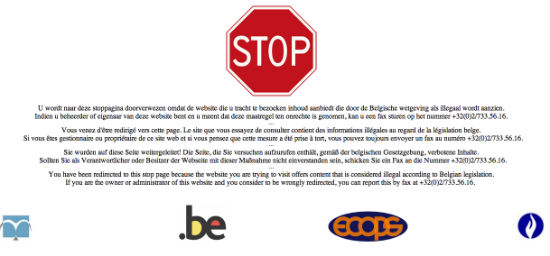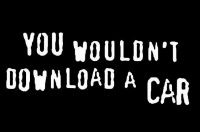Belgian ISPs Quietly Expand Torrent Site Blockade
mercredi 28 août 2013 à 16:45 In 2011 Belgium was one of the first countries to implement a court-ordered Pirate Bay blockade.
In 2011 Belgium was one of the first countries to implement a court-ordered Pirate Bay blockade.
The action was the result of a lawsuit between the Belgian Anti-Piracy Foundation (BAF) and the ISPs Belgacom and Telenet. Through the lawsuit BAF hoped to force the Internet providers to block subscriber access to the famous torrent site.
Initially the Antwerp Commercial Court ruled in favor of the ISPs, describing the notion of wholesale site blocking as “disproportionate”. However, this decision was later overturned by the Court of Appeal and access to The Pirate Bay has been blocked ever since.
As a result of the ruling many regular Pirate Bay users switched to using proxies instead, while others moved on to other torrent sites such as KAT, ExtraTorrent and BitSnoop. These circumvention attempts didn’t go unnoticed by the local anti-piracy group though, as many of these alternatives have now also been blocked.
Starting this past weekend, millions of Belgian Internet users lost access to most popular torrent sites. TorrentFreak was able to confirm that Kat.ph, BitSnoop, ExtraTorrent and H33T are no longer accessible.
Interestingly, KAT’s new domain Kickass.to still works. This is quite an oversight as this is by far the most popular torrent site and the domain is ranked as the 55th most-visited in Belgium. The latest Pirate Bay domain is accessible as well.
Those who try to access the blocked domains through Belgacom and Telenet get a page filled with police logos containing the following message.
“You have been redirected to this stop page because the website you are trying to visit offers content that is considered illegal according to Belgian legislation. If you are the owner or administrator of this website and you consider to be wrongly redirected, you can report this by fax at +32(0)2/733.56.16.”
Blocked (large)

The notice above suggests that the blockade was implemented following a court order but this is not yet available in the public record. However, the Belgian Anti-Piracy Foundation did confirm to TorrentFreak that they have recently filed a complaint at court which targets several torrent sites.
BAF couldn’t provide more details at the moment but said it would most likely release more information in the near future.
None of the affected Internet providers has released a statement on the new blockades. It’s also unknown how many sites are included.
Whether the blocks will be effective remains to be seen. Last week a report from the University of Amsterdam showed that the court-ordered Pirate Bay block in the Netherlands had no impact on local piracy rates.
Source: Belgian ISPs Quietly Expand Torrent Site Blockade

 A decade ago people were truly amazed to find out that they could download entire movies using BitTorrent. At the time there were no official video download stores and YouTube wasn’t around either.
A decade ago people were truly amazed to find out that they could download entire movies using BitTorrent. At the time there were no official video download stores and YouTube wasn’t around either.  For more than seven years isoHunt and the MPAA have been battling it out in court, and in recent weeks the case has heated up once more.
For more than seven years isoHunt and the MPAA have been battling it out in court, and in recent weeks the case has heated up once more. Earlier this year Gottfrid Svartholm became the
Earlier this year Gottfrid Svartholm became the 